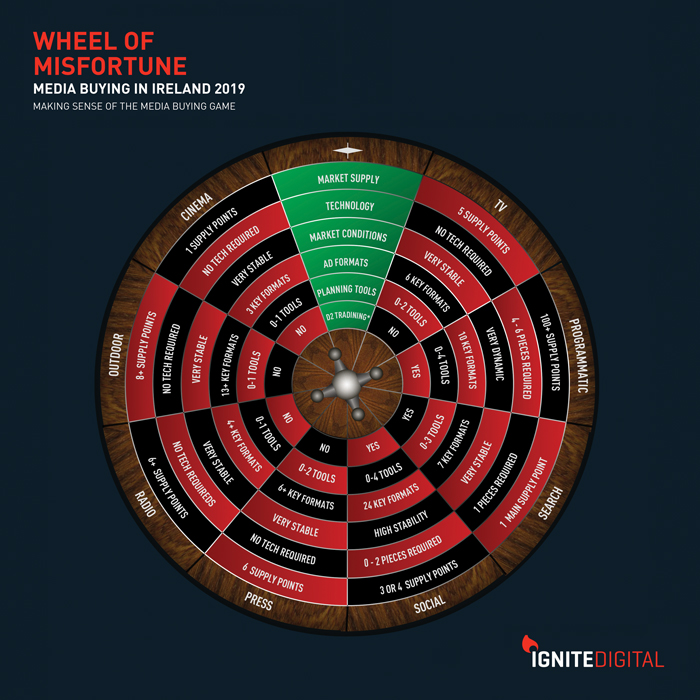
Technology is tempting some big names to do media buying themselves and cut out agencies, but as John Dunne argues, it’s not a binary decision.
As international ad industry headlines highlight brands bringing media buying in-house, speculation is that agencies are doomed, sure to be victims of self-service advertising solutions. When Google and Facebook can offer direct-to-consumer relationships, it’s tempting for brands to think about getting rid of the middleman. From an Irish perspective, the reports of these deaths may be greatly exaggerated. The rush of advertisers trying to do media themselves is as much an opportunity to agencies and ad platforms as it is a threat.
Fit for Purpose
What’s clear is, brands and agencies believe the current setup isn’t fit for purpose: that’s what research by the World Federation of Advertisers (WFA) and management consultancy The Observatory International found. Almost half of agencies feel clients don’t provide them with clear briefs. Is it any wonder agencies miss the target when the goalposts keep moving?
A brand’s decision to take its media in-house poses a variation on the classic business question: should you focus on your core expertise and outsource the rest, or do it yourself?
The most recent development relates to biddable media, where the advent of companies such as Google and Facebook have enabled advertisers to deal directly with media owners with little friction. The growth of online biddable media – paid search, programmatic and paid social (any media that can be purchased via live auctions) – and a general loss of trust in agencies have resulted in increasing noise about advertisers moving towards in-housing.
Greener Grass in-house?
There are two kinds of company in the digital economy: those that have first-party data and those that don’t. The companies that own a lot of first-party data and have direct-to-consumer (D2C) relationships are winning (think Amazon, Google, Netflix and Uber).
There’s a perceived wisdom that in-housing can help cut costs by taking a layer out of the system, while ensuring marketers have a better understanding and more control of their buying processes. In-housing seems very practical – until you realise the ‘unseen’ human resource that goes into programmatic buying. An IAB paper on programmatic in-housing estimates that it takes at least a year to set up an in-house programmatic capability.
This need for more control, speed and scale, rather than a lack of trust in agencies, is the primary reason that a growing number of brands have set up their own data-management platforms and are looking to bring more of their advertising and marketing services in-house and on-site in the client’s office. Such an undertaking in the Irish market will remain a huge challenge.
For most brands, it’s simply not a sustainable option. In Ireland, too many companies lack first-party data and urgently need to find ways to become more like D2C businesses or risk falling behind.
Brands want greater transparency and better control over their data, supply chain costs and execution. But we’re still at the experimentation stage with in-housing: for every success story, there’s a cautionary tale. Vodafone in the UK is reportedly backtracking on its plan to take programmatic ad buying in-house. Internal tensions over whether the marketing or digital team would own and therefore fund the programmatic setup stalled its progress. Other reported stumbling blocks were the spiralling costs of ad tech, talent and publisher relationships.
For any brand that’s considering whether to do its own media buying, there’s a huge array of factors to consider. The media roulette wheel below offers an omnichannel perspective on media in-housing. It highlights the choices within each channel, e.g. TV, programmatic, press etc… open to buyers of media.
As the wheel shows, managing a media supply chain is more complex and challenging than ever before. there are so many variables, and internal and external challenges to bringing media in-house. It’s like playing Monopoly and trying to buy up every space on the board. Yes, it’s possible to do it but a better question to ask is, can you do it efficiently?
Not for the Faint-hearted
In theory, it makes sense that high-spending brands want to seize more direct control of their ad spending. By bringing media buying in-house, they think they’ll gain a better insight into their effectiveness and cut costs. But the decision to do so isn’t always a binary one.
It can mean more cost, time and internal hassle than many advertisers realise. Just a basic tech stack can cost tens of thousands a month. That’s before you think about challenges like talent, resources, experience, and the necessary relationships across the media spectrum. You can save money on agency commissions and have media staff focused solely on your company goals. But it can be hard to find the right people and have adequate clout with media vendors in negotiating rates and placements.
It’s logical to suggest procurement teams would be keen to in-house more media, but in my experience, practitioners who understand the complexities associated with media supply chain are more concerned about the impact this could have on the quality of work and level of talent working on it.
Brands still want a high-end strategic offer when they work with agencies, but they want to be able to pull that expertise as and when they need it rather than paying for a retainer with a traditional agency.
Who’s got Talent?
Programmatic advertising is driven by technology, so you would think having the right software will automatically make your in-housing a success. What’s more important, though, is having talent with the digital know-how to operate the software.
With all the focus on the technology, very little emphasis has been placed on the talents a well-rounded media planner brings to the table. A media strategy isn’t confined to digital channels alone. A cursory look at the media roulette wheel above demonstrates the channel options available. A good media planner understands the relationship between:
- Marketing strategy and technological possibilities
- Innovative ideas and enabling solutions
- Effectiveness and economic value.
We must be cautious about our own Perceptions
With an abundance of buyers and sellers in the marketplace, making the right choices has never been more challenging. What we think is effective and what is actually effective don’t always tally, as Radiocentre’s recent study, ‘Re-evaluating media’, reminds us. Another study from TAM Ireland, called AdLand v TVland, highlights a similar line of thinking from an Irish context when it comes specifically to TV advertising. Given all this choice, and the seismic changes the industry is currently undergoing, an experienced planner is invaluable when it comes to objectively mapping your media channel selection to a clearly defined media strategy.
What are Your Priorities?
Advertisers need to take the lead in developing a new kind of partnership if they truly want to achieve real business success from their media investments. That requires new skills but also involves working closely with their agencies, which often have huge knowledge and experience working with publishers, data and adtech providers across multiple brand categories.
In the topsy-turvy world of marketing, customers want frictionless experiences. Eliminating friction in the digital world is a huge opportunity for the media industry. Without first-party data this will never happen. Every choice involves trade-offs. Moving your programmatic advertising in-house is no exception. You’ll have to be comfortable with the fact that what you gain in control and transparency comes at (and with) costs. Like most things in life, this is a big call to make and the optimum solution when placing your bets on the media roulette table. For now, the best solution lies with a hybrid approach.
John Dunne is managing director of Ignite Digital.
First published in Irish Marketing Journal (IMJ February 2019)© to order back issues please call 016611660




















